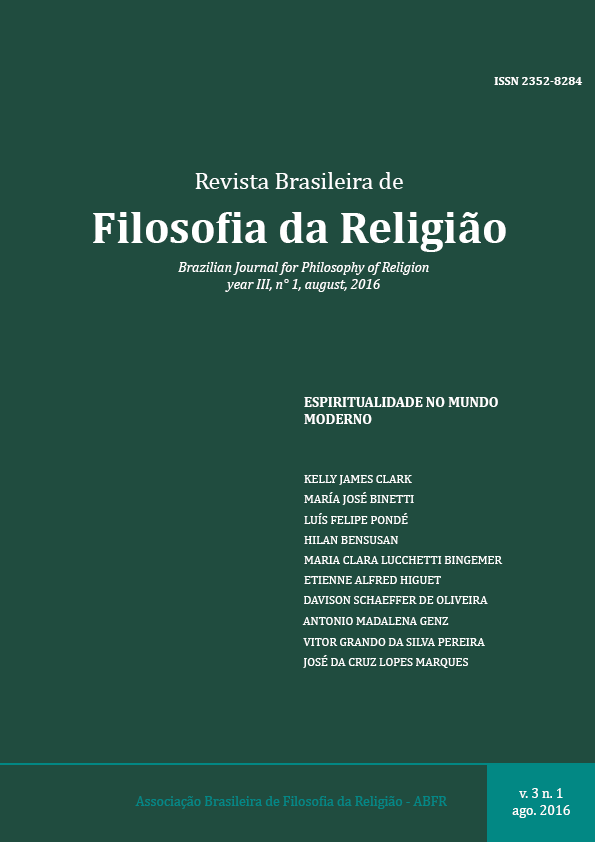A ESPIRITUALIDADE FEMINISTA: EN TORNO DO ARQUETIPO DA DEUSA
DOI:
https://doi.org/10.26512/2358-82842016e13385Palavras-chave:
Filosofía feminista. Diosa. Gran Madre. Vitalismo. Inmanencia.Resumo
El pensamiento feminista nace como una crítica al paradigma
falogocéntrico hegemónico, determinado desde el punto de
vista filosófico por el dualismo abstracto y desde el punto de
vista religioso, por la trascendencia de un Dios perfecto e
inmutable, Padre y Juez de toda la realidad. Junto con la crítica
a la ideología patriarcal, el feminismo avanza hacia una nueva
concepción no dualista de la realidad así como hacia una nueva
espiritualidad liberadora de la energía vital universal. Habida
cuenta de la muerte del dios y el ocaso del padre, el siguiente
artículo se propone reconstruir la prehistórica divinidad de la
Diosa como arquetipo de una nueva espiritualidad, capaz de
regenerar por entero el pensamiento y la cultura hegemónicos.
Downloads
Referências
ARISTÓTELES. Física. Madrid: Gredos, 1995.
_____________. Metafísica. Madrid: Gredos, 1982.
BOURDIEU, Pierre. La eficacia simbólica. Religión y política. Trad. Alicia B. Gutiérrez ”“ Ana Teresa Martínez. Buenos Aires: Biblos, 2010.
BUDAPEST, Zsuzsanna E. The Holy Book of Women's Mysteries: Feminist Witchcraft, Goddess Rituals, Spellcasting and Other Womanly Arts. Berkeley: Wingbow Press, 1989.
CAMPBELL, Joseph. The Masks of God: Occidental Mythology. New York: Penguin Compass, 1991.
DALY, Mary. Gyn/Ecology. The Metaethics of Radical Feminism. Boston: Beacon Press, 1978.
__________. Beyond God the Father. Toward a Philosophy of Women`s Liberation. Boston: Beacon Press, 1974.
ELIADE, Mircea. Mith and reality. Trad. Willard R. Trask. New York: Harper, 1975.
ERNOUT, A. ”“ MEILLET, A. Dictionnaire Étymologique de la Langue Latina. Histoire des Mots. Paris: Librairie C. Klincksieck, 1939.
GARDNER, Gerard B., The Meaning of Witchcraft. London: Aquarian Press, 1959.
GIMBUTAS, Marija. The Goddesses and Gods of Old Europe. 6500 ”“ 3500 BC. Miths and Cult Images. Berkeley ”“ Los Angeles: University of California Press, 1996.
HUMM, Maggie. The Dictionary of Feminist Theory. The Ohio State University Press, 1995.
JANTZEN, Grace M. Becoming Divine: Towards a Feminist Philosophy of Religion. Manchester: Manchester University Press, 1988.
KINDRED, Glennie. Sacred Earth Celebrations. East Meon: Permanent Publications, 2004
LEWIS, James. Magical Religion and Modern Witchcraft. New York: SUNY, 1996.
LEWIS, James - PIZZA, Murphy ”“ BRILL, E. J. Handbook of Contemporary Paganism. Leiden ”“ Boston: Brill, 2009.
MELLOR, Mary. Feminismo y ecología. México: Siglo XXI, 2000.
MURARO, Luisa. El Dios de las mujeres. Trad. M. M. Rivera Garretas. Madrid: horas y Horas, 2006.
MURRAY, Margaret Alice. The Witch-Cult in Western Europe. A Study in Anthropology. London: Oxford University Press, 1921.
NEUMANN, Erich. The Great Mother. Trad. Ralph Manheim. Princeton: Princeton University Press, 1991.
PLATÓN. Diálogos. 8 vols. Madrid: Gredos, 1999.
REID, Síà n (ed.). Between the Worlds: Readings in Contemporary Neopaganism. Toronto: Canadian Scholar’s Press, 2006.
ROSS WHARTON, Edward. Etymological Lexicon of Classical Greek. Etyma Graeca. Chicago: Ares Publishers, 1974.
SJÖÖ, Monica - MOR, Barbara. The Great Cosmic Mother: Rediscovering the Religion of the Earth, New York: Harper Collins Publishers, 1991.
SKINNER KELLER, Rosemary - RADFORD RUETHER, Rosemary. Encyclopedia of Women and Religion in North America. Bloomington: Indiana University Press, 2006.
STONE, Alice. Feminism, Psychoanalysis, and Maternal Subjectivity. New York: Routledge, 2012.
STONE, Merlin. When God was a Woman. San Diego: Harcourt Brace, 1978.
WALKER, Barbara G. Restoring the Goddess Equal Rites for Modern Women. New York: Prometheus Books, 2000.

